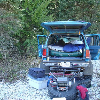http://aamco.com/completecarcare/radiators_cooling_systems.html
Radiators/Cooling Systems.
Cooling System Service.
Did you know that the cooling system, and overheating are the most common causes of mechanical breakdowns on the road? Overheating can cause severe damage to the engine, and transmission.
Coolant (also termed anti-freeze) protects your engine from overheating, and from freezing. The coolant’s effectiveness can diminish over time, and lose many of its protective properties—even causing your radiator to rust, and corrode. The cooling system itself can get clogged with built-up deposits from oil, grease, scale, hose decomposition, and other materials.
Most drivers know it's recommended that a vehicle's oil should be changed about every 3,000 miles. Drivers typically know less about proper intervals for their vehicle's other vital fluids. For the cooling system, the coolant/antifreeze manufacturers recommend changing the coolant once a year, and some service manuals stipulate flushing, and refilling the radiator every 24 months regardless of mileage. Check your car's owner manual to see the recommended interval for changing the coolant in your vehicle. You’ll want to get it changed at minimum every 24 months or if you have any of the following symptoms:
Your vehicle overheats.
Your coolant or temperature light comes on.
Your temperature gauge reads higher or lower than normal.
Your heater does not work.
Radiator, Thermostat and Heater Services.
Due to the cooling system’s critical impact on proper transmission operation, any of the following signs could indicate your vehicle needs service or repairs to the cooling system:
The vehicle is running hot or overheating.
Leaking of a green or orange fluid.
Belts or hoses that have not been replaced during the past 4 years.
Repair or replace any of the following components of the cooling system:
Radiator, radiator cap, radiator hoses, and radiator fan or the fan clutch.
Thermostats.
Water pump.
Fan belts, and serpentine belts.
Temperature sensors.
Heater cores, and hoses.











